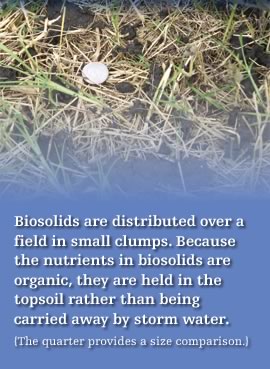

What are Biosolids?
Biosolids are the nutrient-rich organic by-product of municipal wastewater treatment plants. Farmers and gardeners have used biosolids for nearly a century and all 50 states have biosolids programs to promote the growth of agricultural crops and to fertilize gardens and parks.
Biosolids are categorized and regulated by the U.S. Environmental Protection Agency (EPA) according to their appropriate use. Class B biosolids are intended for bulk application on large tracts of land, such as farm fields and woodlands. Class A biosolids are often processed into pellets and sold in small quantities for residential use in gardens and on lawns. Biosolids can also be composted with wood chips and turned into a Class A soil amendment for home use on gardens, shrubs and lawns. Both Class A and Class B biosolids are treated and certified to meet EPA standards for pathogens and other elements.
During treatment at the wastewater treatment plant, bacteria and other tiny organisms break sewage down into simpler, harmless organic matter, which contains essential plant nutrients. While some cities still dispose of the remaining solids—called sludge—into landfills, this is an expensive and wasteful process. The majority of treatment plants process the sludge into biosolids to meet EPA standards for farmland application. This environmentally responsible approach saves valuable landfill space and helps restore and enhance the nation’s dwindling farmland.
![]()
Home | What are Biosolids | Benefit to Agriculture | Biosolids FAQ | For More Information
©2004 NutriBlend, Inc.